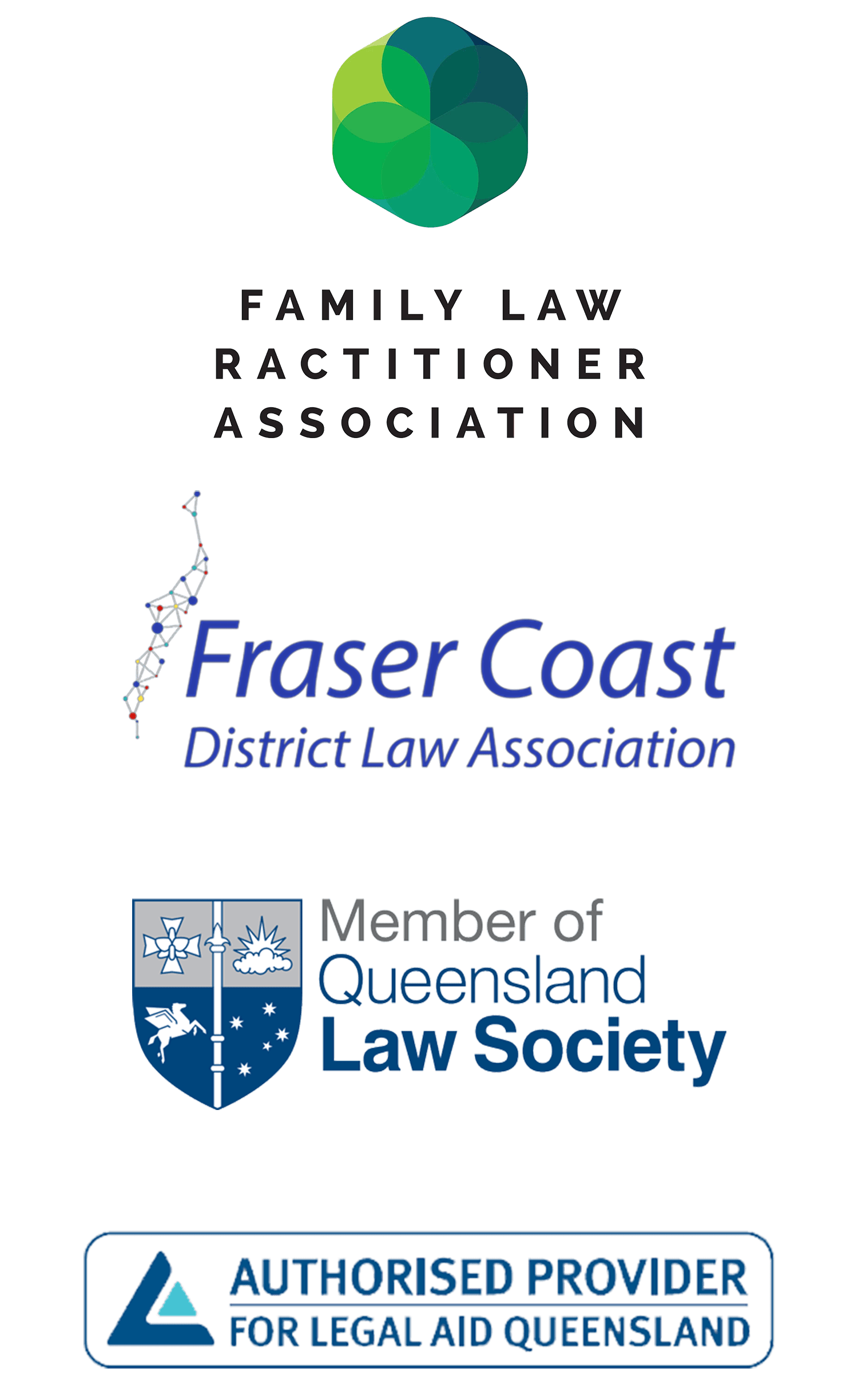Looking for a Family Law Solicitor in Hervey Bay? Family law can be confusing and complicated. Our role as lawyers is to help you understand your legal rights, provide you with options, and empower you to make informed decisions about your future. Each person’s story is unique, but whatever your situation, it is likely that we would have previously helped somebody like you.
We practice in all areas of family law, including:
- Divorce and separation
- De facto relationships
- Property and financial settlements including property transfers
- Children’s matters – parenting plans and parenting orders
- Parental and grandparent’s rights
- Family mediation – children and/or property matters
- Domestic and family violence and apprehended violence orders
- Divorce in Australia including preparing and serving divorce papers
- Spousal maintenance
- Child support agreements
- Reviewing and updating your Will and estate plan post-separation
We are experienced in negotiation and mediation and focus on settling disputes in the most amicable, efficient, and affordable way possible. We encourage our clients to explore these options before proceeding to court.
We’re a proud member of


Dividing your property
A property settlement involves the formal division of assets, financial resources, and liabilities between a couple whose relationship has broken down. It legally finalises their financial affairs and enables them to move on with their respective financial lives. If you and your ex-partner agree on a property settlement, you should ensure that the agreement is legally formalised. If you do not, you may leave yourself open to future claims and may not be entitled to certain stamp duty or capital gains tax relief.
You can formalise the division of your property through consent orders or by entering into a financial agreement (also known as a Binding Financial Agreement).
Consent orders are filed with the court and if the court believes they are just and equitable the court will make the orders, which makes them legally binding. It is important to receive legal advice before agreeing to consent orders.
A financial agreement is a written agreement between the parties that must comply with certain formalities to be valid, including the requirement for each party to receive independent legal advice before entering the agreement.
If your matter cannot be settled, you may need to go to court. In working out your entitlements in a property settlement, the court will take the following approach (which is usually also followed when reaching an out-of-court agreement):
- assess the value of the property pool – taking into consideration real estate, shares, investments, business interests, motor vehicles, furniture, cash, superannuation, etc.
- consider the financial and non-financial contributions made by the parties (taking particular note of any gifts of money, inheritances or windfalls)
- assess any adjustments for the parties’ future needs such as the care of children, health problems and/or income disparity
- determine an overall division that is just and equitable in the circumstances and how to best divide the property pool.
Parenting arrangements
Parenting arrangements can address issues such as where children live, how much time they spend with each parent and other specific issues in relation to education or healthcare. Family law legislation requires that parenting arrangements must be made in the best interests of the child. There is a presumption that shared parental responsibility is best for the child, but this will not always be the case. Shared parental responsibility means that parents are required to consult each other regarding long term decisions for the child and does not necessarily mean that the child will spend equal time with each parent.
Parenting arrangements can be achieved through a parenting plan, consent orders or court proceedings. In most cases, the parties will need to attend Family Dispute Resolution before bringing an application for parenting orders to the Court.
Domestic violence advocacy
To obtain a Protection Order (Domestic Violence Order) in Queensland, the Court must be convinced of three elements: a relevant relationship exists; that domestic violence has occurred; and that an Order is necessary and/or desirable.
Family violence includes actual or threatened assault or sexual assault, stalking, derogatory and intimidating remarks, intentional damage or destruction of property, unreasonable suppression of financial resources or support, and preventing or depriving a family member of his or her cultural connections or freedom.
If you are impacted by domestic violence, we can assist by:
- Drafting and filing an Application for Protection Order
- Responding to an Application for Protection Order
- Negotiating with the other party in an application
- Representing you in Court at mentions and at Trial
- Making an urgent Application for Protection Order
Legal Aid and deferred fees
If you are worried about your legal fees, you may be eligible for Legal Aid funding or assistance for certain matters and in specified circumstances. We are Legal Aid providers and can lodge an application for assistance. In some matters Legal Aid may require a small contribution from an applicant, and you will be advised of this at the time Legal Aid is approved.
Alternatively, you may wish to enquire whether a deferred fee arrangement is available in your circumstances and the pros and cons of such arrangements. Deferred fees are fees that are charged, but payment is deferred until the conclusion of your matter. These arrangements may suit family law property matters where the parties might have some assets but no available cash, or one party to the relationship controls all assets to the exclusion of the other.
Understanding your rights empowers you to make informed decisions after a separation. We strive to resolve family law matters efficiently and cost-effectively, prioritising amicable solutions. When litigation is necessary, our experienced team provides strong and dedicated representation, keeping you informed every step of the way.
If you need any assistance, contact [email protected] or call 07 4125 4818 for a no-obligation discussion and for expert legal advice.
Family Lawyer Frequently Asked Questions
family Law-Property and children
We have an arrangement with JustFund who can assist with financing your family law matter. Click on this link to learn more about our financing options.
THE BASICS
$2,750 property or children
$3,500 property and children
Choose our Basic Consent Orders if you have a single property and superannuation isn’t part of the equation. This bundle includes either (not both):
- Draft Application for Consent Orders and Proposed Orders about property, or
- Basic parenting orders that outline children’s living arrangements, visitation schedules, and special occasion plans.
THE BASICS WITH SUPER SPLIT
$3,300 property
plus $750 to include children orders
Everything that is included in The Basics bundle. However, this is more suitable if you:
- You own more than one property, or
- You are seeking to split superannuation
It’s complicated
From $4,500
Suitable if included in your property pool is a company, trust, self-managed super fund or more than two property transfers
Binding financial agreement
From $3,300 price for drafting and advice
$2,200 price for advice only
A Binding Financial Agreement details how a couple's assets and financial resources will be divided in the event of a relationship breakdown or separation. It can be established before, during, or after a marriage or de facto relationship, offering both parties certainty and protection without requiring court approval.
What’s included in the fee
- One conference to take your instructions;
- Draft Application for Consent Orders and Proposed Orders and one lot of amendments to the agreement (up to one hour of our time to make amendments);
- Provide you with advice about the proposed consent orders;
- File the Application in the Family Court*;
- Advise you of the next steps once the orders have been made.
What’s not included
- Negotiations with your former partner regarding the terms of the agreement (we can help you with negotiations, but this will be at an extra charge).
- Implementation of the orders once they are made. Example: the transfer of a property. You will need to engage a property lawyer for this. We can give you a referral to a lawyer who can help you.
- All fees do not include the court filing fee and outlays that the Family Court charges to process the consent orders.
Fixed Fee Divorce
To determine if we can offer you a fixed fee divorce, we will ask you:
Have you been married for at least two years?
Have you already separated from your spouse?
Have you lived separately and apart for at least 12 months?
Does your spouse consent to the divorce?
Is there care arrangements in place for any children who are currently under 18 years of age?
Are you and your spouse Australian citizens or residents, with Australian mailing addresses?
Is your marriage certificate in English?
fees for divorce applications
Our professional & administrative fees $990
Our fixed fee divorce service includes:
- An initial consultation with you to collect information and verify that you can proceed with a divorce application
- Preparing a draft Application for Divorce for your approval
- Filing your Application for Divorce with the Federal Circuit and Family Court of Australia
Additional Costs
Although most divorces fall within the scope of our fixed fee service, there may be additional costs in some cases, such as:
- ► Acquiring a copy of your marriage certificate
- ► Translation of non-English marriage certificates
- ► Requiring the use of a process server to serve documents to your spouse
- ► Your spouse refusing to sign the application or accept documents
- ► Affidavits to provide additional supporting information to the Court
- ► Attendance at Court by a solicitor
In any case, we will discuss any additional costs with you during the initial consultation.
initiating application or response to initiating application (to end of first mention)
If no agreement can be reached between you, an application can be made to the Federal Circuit and Family Court of Australia to seek parenting and/or property orders both final and interim orders.
If no agreement is reached in the time limit set by the FCFCOA further preparation of documents to apply or respond for Interim & Final Orders:
$5,500 (property or children)
$7,000 (property and children)
Ongoing legal fees we will inform you of as your matter proceeds through the court
DISPUTE RESOLUTION CONFERENCE/MEDIATION RESOLUTION
This is the quickest and most cost effective option for people newly separated to come to a workable agreement for their children and/or property settlement. We have excellent lawyers who handle all matters including complex situations. Consults with you and up to 4 hour conference (Includes: pre-mediation conference, preparation for mediation, and attendance at mediation) -suitable for Parenting OR Property Matters:
$2,750
up to 6 hour conference (Includes: pre-mediation conference, preparation for mediation, and attendance at mediation) -suitable for complex parenting or property matters or where both parenting and property matters are to be dealt with:
$3,850
Mediation sessions can be conducted face to face at our Hervey Bay office or via TeamViewer/Zoom.
If you come to an agreement at the mediation, we can formalise them, and make them legally binding once sealed by the Federal Circuit and Family Court of Australia (Consent Orders).
Consent Orders (If agreement reached at conference) additional fee of $1,100
GET STARTED
- ► You can book an appointment online using our booking calendar - Click here! or call us on 07 4125 4818 and ask about our consent order bundles.
PLEASE NOTE: The above indication of costs is correct as of January 2025 and is subject to change at any time.
WHAT OUR CLIENTS SAY ABOUT US

As relatively new residents of Hervey Bay and first time clients, we were most pleased to find that Turner Riddell are everything they claim to be on their web site. Claire and her team are very approachable and also respectful of the client, whilst also presenting as professional and knowledgeable. Claire was very welcoming and patient with us, readily making us feel at ease in communicating our circumstances and requirements. We unreservedly recommend Claire and her team to future clients.

I walked into Claire’s office a broken woman, facing separation and property settlement post-DV. I had lost hope of ever being financially back on track. But with her help I am about to by my first home for me and my 3 children. Eternally grateful. She handled all the complicated stuff and I trusted her with making the right decisions for me. 5 stars. Claire has turned my life around.

This process was made really easy and clear for us. From initial appointment to completed documents was super fast and efficient. The team has been very responsive to our questions and highly professional along the way. And we’ve felt very comfortable and fully informed throughout the process. Thanks Claire and Natalie.

Visiting Claire Riddell at Turner Riddell Lawyers in Pialba, Hervey Bay was a breath of fresh air. Speaking to a real person is not always possible when a lawyer is on the agenda but Claire was a vibrant friendly person who explained all aspects of my duties whilst making me feel at ease. It does not take much to have a pleasant experience so if you want the same I suggest that you make Claire Riddell at Turner Liddell Lawyers, your next stop when you need legal advice. You will not be disappointed.



 Have you been married for at least two years?
Have you been married for at least two years?

 Start My Will Online
Start My Will Online FAMILY LAW CONSULT
FAMILY LAW CONSULT